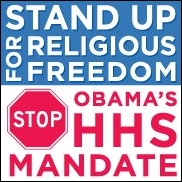The “Judicial Theocracy” of the HHS Mandate
Posted by John Jansen (January 4, 2013 at 5:04 pm)
 Earlier today the Stand Up for Religious Freedom Coalition encouraged everyone to take part in Standing with Hobby Lobby Day tomorrow, January 5.
Earlier today the Stand Up for Religious Freedom Coalition encouraged everyone to take part in Standing with Hobby Lobby Day tomorrow, January 5.
Hobby Lobby’s owners, David and Barbara Green, filed a federal lawsuit over the HHS Mandate last year, but their request for emergency injunctive relief was denied by federal district Judge Joe Heaton, meaning that the Greens could face $1.3 million in fines per day for their refusal to comply with the Mandate, which went into effect January 1.
A fascinating article appeared in The Public Discourse this week that points out the rather frightening implications of Judge Heaton’s ruling, as well as another ruling by Judge Carol Jackson, who had previously dismissed another challenge to the HHS Mandate brought by St. Louis businessman Frank O’Brien. (Jackson’s ruling was subsequently overturned by the Eighth Circuit federal appeals court, but Heaton’s ruling was upheld by Tenth Circuit.)
The article is provocatively titled “The HHS Mandate and Judicial Theocracy.” In it, Dr. Melissa Moschella draws attention to the core of the argument put forth by Judges Jackson and Heaton and their respective decisions:
“The burden of which plaintiffs complain is that funds, which plaintiffs will contribute to a group health plan, might, after a series of independent decisions by health care providers and patients …, subsidize someone else’s participation in an activity that is condemned by plaintiffs’ religion.” Jackson goes on to claim that subsidizing these objectionable services is no different from paying an employee’s salary, which the employee may then use to purchase contraception or procure an abortion. Judge Heaton agrees.
The problem, however, is that paying an employee’s salary and providing that same employee with health insurance coverage for specific services are vastly different things, akin to “the difference between giving cash to someone, and giving, say, a gift certificate to a steakhouse.”
Dr. Moschella writes:
[I]t becomes clear that while paying a salary has no intelligible link to any particular use of that salary, giving insurance—a voucher for a specific range of products and services—does have an intelligible link to precisely those products and services for which it may be used.
She goes on to warn, chillingly:
If, on the other hand, Jackson and Heaton are right that there is no difference between paying a salary and offering insurance coverage, then employers would also have no reason to object to a mandate requiring that all health plans cover surgical abortions.
Surely, were the HHS Mandate to hold up in court, mandatory insurance coverage for surgical abortions will soon follow. We delude ourselves if we think otherwise.
Moschella then gets to the heart of the matter:
Jackson and Heaton’s logic is therefore inherently flawed: giving money, a perfectly fungible good, differs significantly from giving insurance, which has an intelligible link to a limited range of products and services.
But even if the reasoning were sound, it is nonetheless problematic because its subject matter—moral theology—does not belong in a court decision at all. By using this argument to deny that the mandate constitutes a substantial burden on religious practice, these judges are stepping well outside their proper area of competence. They are making a decision not based on legal reasoning, but on philosophical and theological judgment.
In her ruling, Judge Jackson actually wrote that, notwithstanding the plaintiffs’ claims that complying with the HHS Mandate would violate their bona fide religious beliefs, “the challenged regulations do not … prevent plaintiffs from acting in accordance with their religious beliefs.”
So much for the separation of church and state!
As Moschella rightly observes:
In effect, Judges Jackson and Heaton are telling the Greens and Frank O’Brien—and by extension the 108 other plaintiffs challenging the mandate as well—that they, and the religious authorities who support them, simply have their theology wrong.
It’s more than a little troubling when judges take upon themselves the prerogative of making determinations about moral theology.
God save our honorable courts.
